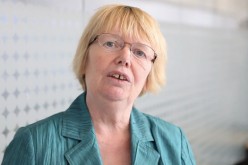The Teaching Resource in Business and Economics (TRIBE) is a free resource, created and curated by Westminster Business School and part-funded by the Commercial Education Trust (CET) which aims to foster the deeper learning of business and economics by coupling theory with real world examples in order to help students contextualise their studies. Spearheaded by Senior Lecturer in Economics and Quantitative Methods, Karen Kufuor, and endorsed fully by the school Dean, Professor Barbara Allan, TRIBE has recently superseded its subscription targets and secured a further £26,000 in external funding. To read the introduction to TRIBE please visit the first blog entry in this series, to read some testimonials please visit the second entry, and to read an interview with Lead Academic, Karen Kufuor, visit the penultimate blog entry.
For this final entry in the TRIBE blog series, and in order to gain a better understanding of the aims and scope of the project, we interviewed Dean of the Business School, Professor Barbara Allan.
Can you tell us about TRIBE?
B: TRIBE is a learning resource which has been developed by academics in the Business School, and its purpose is to help teachers and pupils to learn more about economics and other business matters. Originally it was purely designed for use in schools, but what we’ve found is that it’s actually excellent for college and university students to use too. TRIBE offers up to date, topical information which can be easily.
What gap does TRIBE fill in the current media landscape?
B: TRIBE’s unique selling point is that it provides teachers and students with really up to date and topical information that’s relevant to the syllabus, and if you’re a student or teacher it’s very easy to get swamped with information from the television, the web, newspapers and textbooks and it’s possible to get quite lost in this sea of information, and what TRIBE does is it identifies topical issues and it provides information on this topic which is very, very useful.
What scope does TRIBE have to continue?
B: I hope it will continue. I hope it will grow. I hope it will become self-sustaining. I think for the University, and the Business School, we’ve been very lucky as TRIBE has been supported financially by the Commercial Education Trust (CET) and we’re very thankful for them supporting it. I think longer term I would hope that we’ll find other ways of financing it, so it continues and becomes really imbedded in the way students and teachers access information across the whole country.
How does TRIBE benefit students at Westminster Business School?
B: For Westminster Business School students it can help in two ways, the first is that it provides really up to date, relevant and online resource for economics and business students. Secondly we want our students to be involved as co-producers of information, finding useful information, writing articles and uploading them onto the TRIBE site. In doing this, they will not only develop their analytical and writing skills but it will also help improve their employability.
Tell us more about TRIBE events, why are they important?
B: I think the events are really important, and in many ways they complement the online resource. Certainly in my experience, people like to come together, they like to talk to one another and they like to hear from speakers who perhaps have a unique experience, and who are experts in their own subjects. So for me, having events brings people together, helps them to develop and become part of a community and it also updates their knowledge. I think when we have events on campus that school students and their teachers can come to, that’s important, because some people think Universities are places that aren’t for them, but when they come to Westminster Business School they realise that we’re very friendly and open, and that we really want to mix with our school and college communities and really welcome those students, perhaps as our students in the future.
